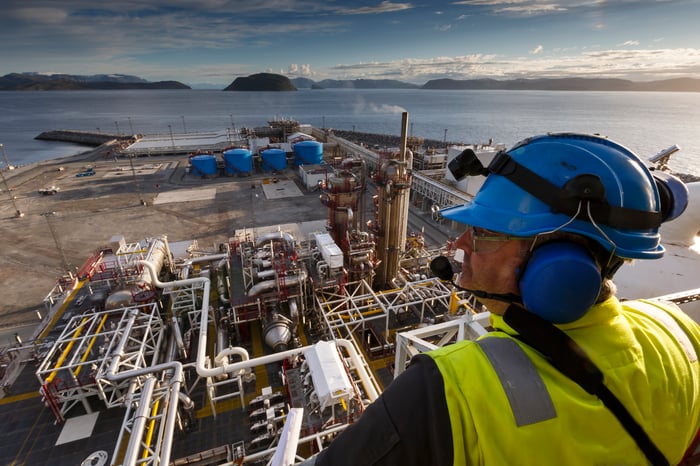What happened
Shares of North American midstream energy giant Enterprise Products Partners (EPD -0.68%) rose over 5% today, peaking above that mark in the early afternoon. At roughly 2 p.m. EST, British integrated oil major BP (BP 0.14%) was up about 9%, and Canadian oil sands specialist Suncor Energy (SU -0.15%) was up roughly 10%. Global energy services giant Halliburton (HAL -0.62%) was having an even better day, with its stock up around 11%, while tiny U.S. onshore energy producer Callon Petroleum (CPE) was higher by 13%. And large, diversified U.S.-based driller Occidental Petroleum (OXY 0.16%) had advanced an impressive 14%. The theme running through all of these gains is the price of oil, but there's a different reason why for each case -- and the reason was more than just oil was up.
So what
Exiting 2020, energy prices were off of their lows but still bouncing along at a level that made it difficult for many drillers to turn a profit. Although demand had started to recover from the hit it took when countries around the world effectively shut their economies to slow the spread of the coronavirus, OPEC's efforts to curtail supply also played a vital, stabilizing role. There's a lot more to that story, but this is the basic backdrop for the rally today.

Image source: Getty Images.
OPEC and its partners have been meeting to discuss potential output increases, given that oil demand has been improving. The group had earlier agreed to slow and steady production hikes to be spread throughout 2021. Wall Street, however, has become increasingly worried that the new spike in coronavirus cases would lead to demand disruptions. And, thus, OPEC's meeting has taken on outsize importance. The final call, however, which was hinted at earlier in the day, was that production in February would remain unchanged. Investors rejoiced and sent energy prices sharply higher.
The thing is, Wall Street's excitement is likely about more than just a month or two of production levels. The decision is really a statement that OPEC appears willing to act in a prudent fashion to ensure supply and demand don't get massively out of sync again. And that has material implications throughout the energy industry.
For example, one of the key problems in the midstream sector in which Enterprise operates has been a fear that demand from its energy industry customers would remain weak. That would mean less oil, natural gas, and the products into which they get turned flowing through its system. It would also mean less new infrastructure would be needed, potentially stymying the master limited partnership's growth prospects. However, if OPEC is willing to support oil prices, the negative expectations may not actually come to pass. Thus, Enterprise rose notably.
A similar story holds true for energy services provider Halliburton, which relies on the willingness of exploration and production to invest in drilling projects. Low energy prices generally mean less investment, and higher prices the opposite. OPEC's decision could mean that prices will eventually rise high enough, and stay there long enough, to see an uptick in capital spending in the energy sector.
As for the upstream names, which includes Callon, Suncor, Occidental, and BP, OPEC's prudence could have a direct impact on revenues and earnings if it leads to sustained higher oil prices. Callon is a tiny name in the sector with a heavily leveraged balance sheet, sporting a troubling financial debt-to-equity ratio of more than 16 times. Higher oil prices will make it dramatically easier to carry that weight and muddle through the current headwinds. Suncor's oil comes out of vast mining operations in Canada, which compete better with more traditional drilling projects when oil prices are high. And Occidental, a large traditional driller, made an aggressive, debt-fueled acquisition in 2019 that turned into an albatross when oil prices cratered just a few months later. Higher oil prices could turn that deal into a winner, or at least less of a loser. Even BP, which is looking to downplay its energy business as it looks to shift more toward clean energy, was rewarded with a notable price advance. Higher oil prices, perhaps ironically, will provide it with more cash to make the move away from oil.
Now what
Today was a very good one for the historically volatile energy sector. In fact, key U.S. benchmark West Texas Intermediate bounced above a significant price level, which likely supported the broad rally. However, investors shouldn't take one day and extrapolate a trend. The energy sector is volatile, so today's gain could very easily turn into a loss tomorrow. And with a rise in coronavirus cases around the world, there are still major headwinds for the energy sector to face. Most investors will probably be best off sticking to the largest and financially strongest energy companies.






